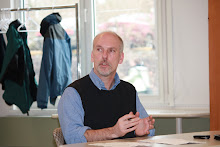On June 1st, to mark the twentieth anniversary of the Tiananmen massacre, the Canadian organization “Rights and Democracy” invited three well-known spekaers to participate in a Round Table discussion at the Centre d’Archives de Montreal: Rowena Xiaoqing He, rechercher at the Fairbank Center for Chinese Studies at Harvard University; Charles Burton, political scientist at Brock University, and former student of the history of Chinese thought at Fudan University in Shanghai; and Cao Chungguo, author of the book I Was at Tiananmen and editor of the Chinese-language version of the China Labour Bulletin. The three joined to discuss the heritage of the 1989 movement. Cliquer ici pour la version française.
From the outset, Rowena Xiaoqing He and Cai Chongguo emphasized the enormous effect that the events had had on them personally, as well as on most of the students present in Tiananmen twenty years ago. This was a seminal moment, and the ensuing tragedy left indelible marks on their lives and sowed the seeds of an enduring democratic faith. This is what gives them the courage to fight against the fading memories, and to contest the official vision of the movement which seeks to erase 1989 from the collective memory of the Chinese people. Rowena He, who admits that the ignorance of succeeding generations concerning Tiananmen leaves her feeling alone and even desperate, continues nonetheless to decry Peking’s efforts to silence all out dare question the official version. Rowena He cites for example the courage of the « Tiananmen Mothers », who continue their struggle to have the memories of their sons and daughters properly honored, to have an official enquest into the events of 1989, to see victims’ families compensated and the guilty parties punished. Arguing that China needs above all stability and economic development, the Chinese authorities refuse to confront the legacy of the tragedy. Indeed, instead of reconciliation, the Tiananmen mothers are met with insult: their web site is blocked and their image sullied in propaganda pieces depicting them as criminals having raised their children to be lap dogs of the West.
Rowena He also mentions the example of Yuan Weishi, best known for his article, “Modernization and History Books.” In this 2006 article, Wei denounces the historical distortions by which the Party blinds the youth to their own history. Mincing no words, Wei blames the Communist Party monopoly on history for most of the abuses committed during the Maoist period—and notes the Party continues to enjoy such monopoly rights. Immediately following the publication of this article, the license accorded to “Freezing Point”, weekly supplement to the China Youth Daily where Yuan had published his thoughts, was revoked. This case led the speakers to wonder “who is educating whom?” in China.
Cai Chongguo was more positive. He notes that China has changed dramatically since 1989, and that some of these changes are hopeful. In his eyes, the rise of the internet has created a new forum for discussion, a new public space, and stands as an important rupture in the formerly solid wall of official censorship. The internet has enabled the movement to enter a new phase, having resolved certain previous problems of communication. More than 200,000,000 Chinese use the internet today. There are more than 70,000,000 blogs. Of course censorship continues to exist, but the internet is difficult to control. In the pre-internet age, certain topics were simple off-limits. For example, the question of democracy. Censorship has not disappeared, but takes on new forms. Using specialized software, the authorities focus on certain words, and less the people behind the words. But as we know, dedicated bloggers and net-users in China have been quick to get around this problem, using more subtle language.
For Charles Burton, it is China’s unique character that captivates his attention, China’s knack for confounding its observers. Since the 1980s, China has refused to respect the theories of political development, theories of modernization, or any theory insisting on a correlation between economic development and democracy. One would well wonder how many followers of Seymour Lipsett’s “Political Man” have been tracking China’s urbanization, industrialization and educational development in order to predict the arrival of democracy in the Middle Kingdom? Burton admits straight out that he used to be one of them! Now he tends to see China as a case apart. China had set up a new sort of apartheid allowing urban residents to prosper in a way that the peasants—condemned to a life in the countryside by the hukou (internal passeport) could not. In such a system, democracy could only be seen by the urban elite, the new bourgeoisie, as a threat to their rights. Burton remains optimistic nonetheless, noting that a majority of Chinese today approve the principles of Charter 08, even if there is considerable division on the question of how to move forward.
The three speakers reveal a movement which is becoming increasingly pragmatic. Instead of hoping for a deux ex machina, the group’s hopes lie rather in concrete actions among the people. Knowing that at the moment, no group could contest the Communist Party if elections were to be held, the democracy movement chooses to respect Chinese laws and the Chinese constitution. The time has come to create a dynamic public space to promote the circulation of ideas. The time has come to stop asking, and to act.
Charles Hudon, in Montréal
6.07.2009
Subscribe to:
Post Comments (Atom)

I was there. M. Hudon has made an exemplary summary of the main points of the 2 hours of discussion that evening at Centre d'archives de Montreal. Thanks for posting this.
ReplyDelete